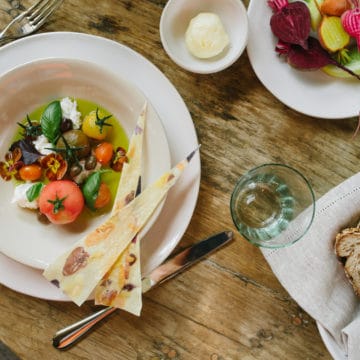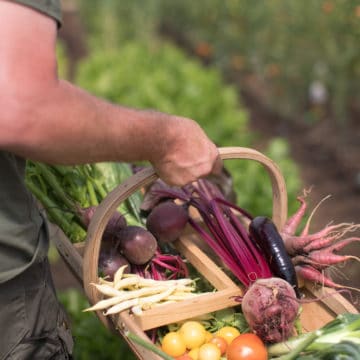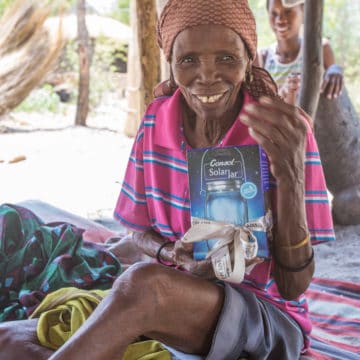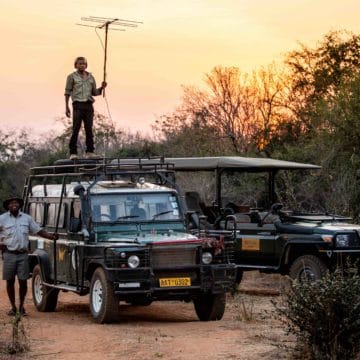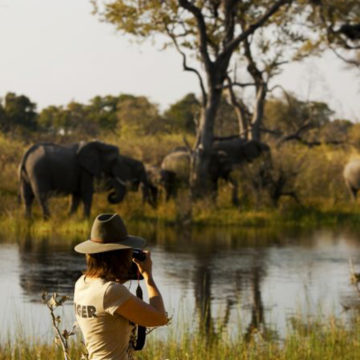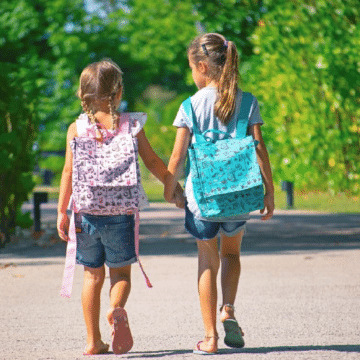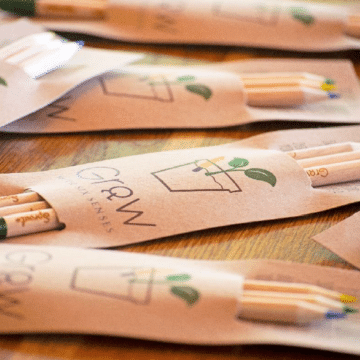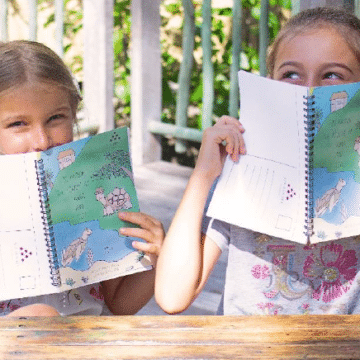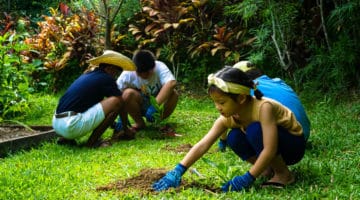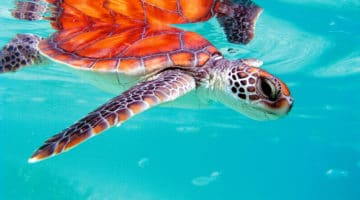Celebrating Earth Day
April 22, 2019 by Hidden Doorways
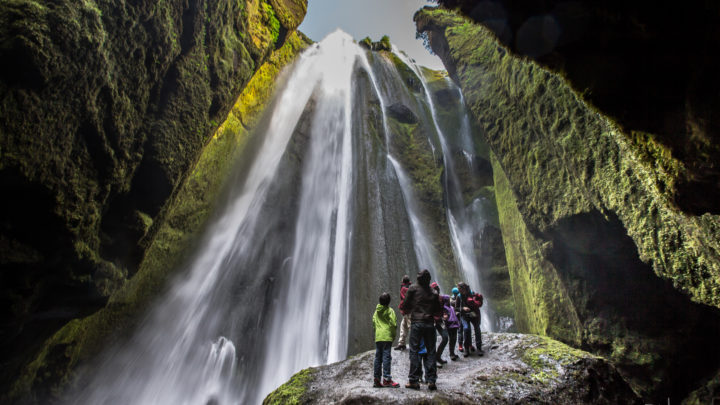
“The Earth is what we all have in common.”- Wendell Berry
Travel transcends borders while connecting us to be more mindful about our footprint and the ability to make a positive impact in the world around us, a core belief to our ethos. As we celebrate Earth Day on April 22nd, we are highlighting a few of our clients who are paving the path for conservation and sustainable tourism in order to preserve the surrounding ecosystem and support local communities across the globe.
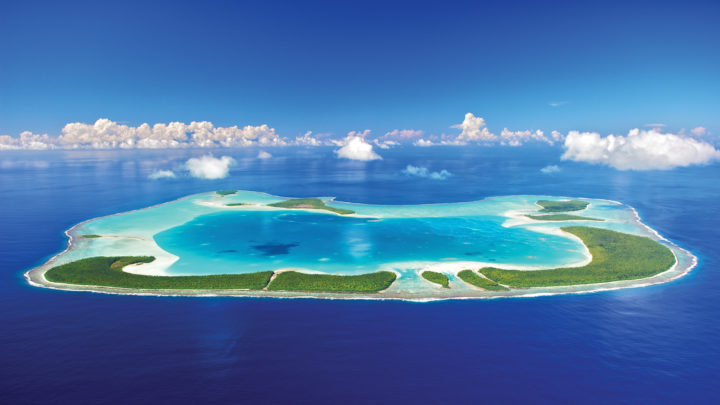
The Stewards of Tetiroa: The Brando
American actor Marlon Brando first came to the area while filming Mutiny on the Bounty and was instantly enchanted by the island’s rare beauty. He teamed up with a local conservationist in Tahiti to create The Brando with a sustainable future in mind for travelers visiting its eco-rich shores.
Set in the Tetiroa Atoll in French Polynesia’s Tahiti, The Brando leads the global standard for sustainable resorts known as the first resort to obtain a LEED Platinum certification. It is close to being carbon neutral and self-sustainable from relying on renewable energy sources including solar power and biofuels. Considered the stewards of Tetiroa, The Brando is committed to protecting and preserving this motu’s natural habitat. From its architecture, each of the 35 villas are constructed from local and recyclable materials which blend harmoniously in to the palm trees honoring Polynesian traditions. To reduce energy demands, it has developed Sea Water Air Conditioning (SWAC) which separates the coldness from the deep ocean water to provide low-energy yet highly efficient cooling for all of the buildings and developed an innovative waste-water management system for irrigation. As late as the 1970’s, Marlon Brando conceived this idea to help with the island’s aquafarming and collaborated with Richard Bailey on applying these techniques without compromising the resort’s comfort for its guests. And today it has cut the resort’s energy demands by almost 70%. While solar energy produced from photovoltaic solar panels along the airstrip provide over half the resort’s energy needs and hot water supply.
In pursuit of Marlon Brando’s dream for sustainable interdependence on Tetiaroa, Ecostation, known as Te Fare rauihi (The House of Multiple Sciences) was conceived as a place where scientists from around the world come together to lead scientific research and culturally improve the relationship with nature. TeMana O TeMoana (The Spirit of the Ocean), a Tahitian nonprofit, is devoted to the protection of marine wildlife, particularly the green sea turtle, and creating youth educational and public outreach programs.
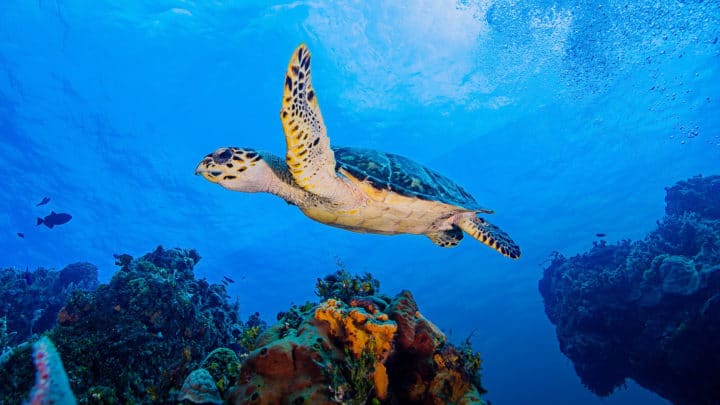
The Marine Sanctuary: Banwa Private Island
Sustainability is a pillar of Banwa, a 15-acre private island set in the Philippines Northern Palawan region which was a decade-long passion project for its founder. The Aquos Foundation supports nature and protects the island’s delicate ecosystem through conservation research initiatives by world leading experts. Its mission is to support, protect and nurture the island’s unique marine life, flora and fauna, for future generations. Banwa is an incredibly special place where you are not just observing nature but become part of it. Much of the produce is grown locally on the island’s own organic farms, including its harvested honey and Banwater, which is sourced 500 feet below the surface in a naturally replenishing reservoir. While on land, it is a long-established nesting grounds for the critically endangered Hawksbill Turtle, home to the indigenous Tabon Bird, and the rare Mantanani Scops Owls in addition to hundreds of other species. Underneath the sea, the Aquos Foundation is committed to its local communities and reef regeneration programs and reef ball placements to stimulate the growth of new corals for new habitats for the island’s treasured marine life. Reciprocally this initiative will benefit the surrounding local communities as the fish stocks will be replenished as a result of controlled fishing zones and habitat regeneration while educating and inspiring communities through its work with expert wildlife and environment advisors.
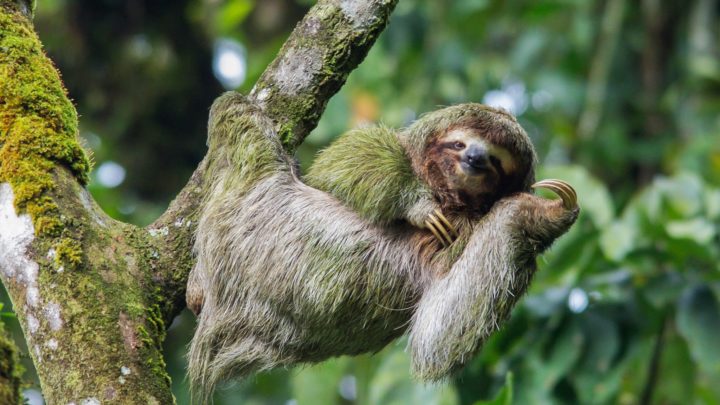
Traveling Deeper with Costa Rican Trails
Resting snugly in between Nicaragua and Panama, Costa Rica is a paradise for nature enthusiasts where rare ecosystems, mysterious natural phenomena and isolated native cultures can be found in the country’s lush rainforests. Costa Rican Trails is a bespoke travel company that is dedicated to providing a variety of authentic and inspirational journeys throughout Costa Rica and Panama for over 25 years. Its mission is to deliver enriching life experiences that connect travelers to nature and the communities that they visit. Activities include guided ecology tours or private excursions with an expert in geology and volcanology to study historical lava flows in the Arenal Volcano National Park. Also, guests can take a green tour in Costa Rica where proceeds are allocated to planting a tree. Over the last 15 years, Costa Rican Trails has been committed to providing guests with unique customized itineraries that connect travelers with nature, wildlife and its surrounding ecology.
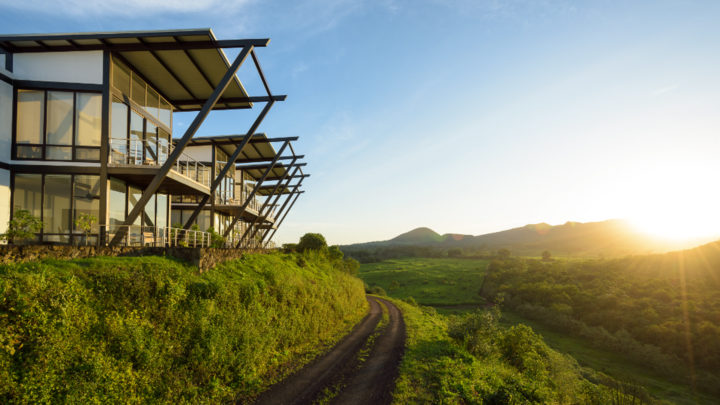
Eco-tourism in the Galapagos: Pikaia Lodge
The Galapagos is one of the most ecologically diverse yet fragile place on the planet. Adventurous travelers come from across the world to witness rare species and explore its rare habitat while there is a threat that over-tourism will harm the equilibrium of the wildlife. The Galapagos National Park Service and the Ecuadorian environmental authorities have worked to strike a balance between development and preservation through its land-base model. This model harness economic development and prospects to the local community. Before, most travelers explored at sea on a yacht or cruise. To manage visitors, permits have been issued for sea-based excursions in addition to day-tour diving permits which protects sharks and other marine life so divers and snorkelers can witness them where before were illegally caught by local fisherman.
Pikaia Lodge is a leader in eco-tourism in the Galapagos by supporting land-based tourism, replanting trees and embracing a sustainable building design. Plus, Pikaia Lodge has created more than 60 new jobs for Santa Cruz Island residents and contributes substantial resources to the island’s economy. Under the direction of the Ecuadorian Architect Humberto “Coro” Plaza, Roxana Castillo and interior designer Maria Elena Frei-Shephard, created the lodge, which took almost five years to build. Using recycled material, The bathroom tiles are made from lava stone collected from local sites while the rainwater-collection roofs use reserves osmosis to filter water for cooking and drinking. Solar panels and ceiling ventilators heat, cool and provide electricity to the lodge. The lodge is carbon neutral and powered by a mix of conventional and alternative energy sources that do not pollute or emit greenhouse gases in addition solar water heating collector panels used for solar photovoltaic energy production.
From Seed to Table: Heckfield Place
Heckfield is a living place, a 45-room English Georgian family home lovingly restored from its classic origins and rewoven into 400 acres of secluded Hampshire landscape. The five-acre home farm with biodynamic principles is symbolic with a culinary program led by Culinary Director, Skye Gyngell of London’s Michelin Star Petersham Nurseries and Spring. Celebrating simplicity, seasons and a sense of place, she runs 300 acres of organic farmland and orchard to fuel her menus at Marle and Hearth restaurants. There are 400 hens in addition to sheep, pigs, lambs, bees producing rich honeycombs at the farm. There are no plastic nor paper products on property, and they only use reusable bottles for water. Guests connect to the earth’s roots by touring the lush forest filled with centuries old dense woodlands with an arborist and learn about the 19th century English gardener, William Walker Wildsmith. The Little Bothy Spa is stocked with products from Wildsmith using ingredients straight from the farm. Curious guests can gather at The Assembly which is a space to unearth, reconnect and rediscover with special educational programming and talks.
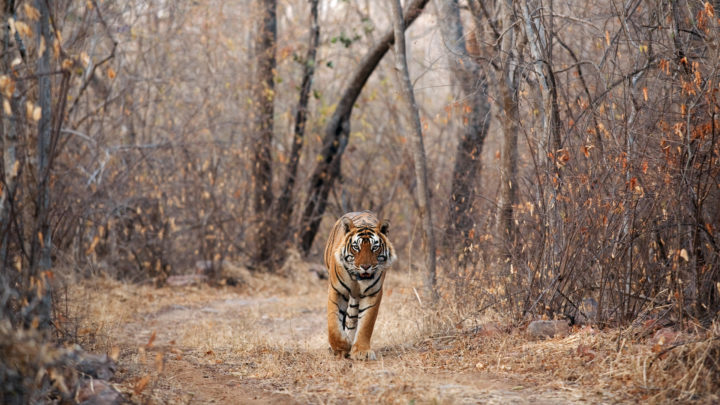
Protecting India’s Tigers: SUJÁN’s Sher Bagh
SUJÁN, a collection of family-owned Relais & Chateaux luxury camps and palaces across India, are deeply rooted in protecting the wilderness & wildlife in their country by creating luxury travel experiences as a catalyst for conservation. The SUJÁN family has been working with tigers through pioneering filming, monitoring, researching and creating awareness about these majestic cats in Ranthambore for generations. In 1988, they established The Ranthambore Foundation, a non-governmental organization (NGO), that works closely with the development of villages around the park boundaries.
Today Jaisal and Anjali, co-owners of SUJÁN, have since continued their family’s legacy of tiger conservation since 1974 through the creation of SUJÁN Sher Bagh, 12 luxurious tented camps set on the border of Ranthambore National Park. For every guest who visits Sher Bagh, inclusive of all SUJÁN properties, a conservation contribution fee is incorporated into the rate. This fee provides financial support and resources to our conservation partners in Ranthambore such as Tiger Watch, NGO and their Village Wildlife Volunteers Programme (VWV).
SUJÁN continues to provide financial support and resources to conservation partners such as Tiger Watch, a Non-Governmental Organization and their Village Wildlife Volunteers Programme (VWV), a group of individuals drawn from villages along the periphery of or in close proximity to the boundaries of Ranthambhore Tiger Reserve. Working closely with the Department of Forests and the government of Rajasthan, this initiative has provided crucial information on poachers as well as on illegal activities such as mining and logging leading to more secure corridors for wildlife, including tigers. Today SUJÁN’s Conservation initiatives are active across several districts of Rajasthan focusing on habitat preservation, redistribution of land to wildlife, holistic community development and monitoring, anti-poaching and research.
Giving Light to Communities: Great Plains Conservation
Since its inception, Great Plains Conservation and its Foundation has been at the forefront of preserving some of the world’s fragile and unique ecosystems while uplifting local communities. Guests at any one of the thirteen camps throughout Botswana, Kenya, and Zimbabwe can support a range of projects in the area such as Rhinos Without Borders, Conservation Education and Land for Lions which supports projects like Maasai Olympics and herder training in Botswana to reduce human-wildlife conflict.
In Botswana, Great Plains has partnered with local schools that border the Okavango Delta. Hosting the annual Student Conservation Camps to inspire curious minds on the future of conservation. While the Solar Lantern Initiative has brought safe, sustainable, and environmentally friendly light to hundreds of households in villages bringing together communities surrounding the Okavango Delta.
Always looking ahead, the Great Plains Foundation has ambitious projects in development ranging from significantly expanding the local educational and job training to replanting forests of indigenous trees throughout its concessions. As its projects evolve, Great Plains continues to strive to meaningfully engage individuals and local communities.
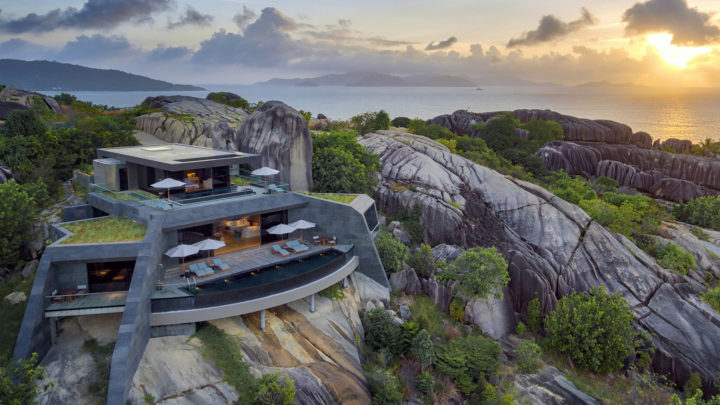
Sustainability at its Core: Six Senses Hotels Resorts Spas
Six Senses Hotels Resorts Spas has been paving the path for sustainability since its first resort was founded in 1995. The brand leads travelers to places where they can reconnect themselves in exotic destinations that breathe harmony, wellness and nature. Expanding its footprint across 21 countries, it continues to implement new sustainable initiatives in a seamless way. Sustainability is not what Six Senses does, it is who they are. Each property has their own Sustainability Fund to support social and environmental projects. Eat with Six Senses and Earth Labs are unique to each property which boost your health and promote local sourcing of ingredients and organic gardening to fuel its restaurant’s seasonal menus. While it avoids synthetic pesticides or fertilizers and incorporates organic farming techniques and efficiently uses recycled water for irrigation. ‘Zero waste’ management is also an integral part to minimize overall waste and to facilitate collection, separation, composting, reusing and recycling of waste material generated on the property. When constructing the foundation for their properties, Six Senses utilizes architectural strategies that incorporate local culture that influence the design and incorporate building materials are local and sustainable and may incorporate certified wood, recycled and rapidly renewable materials in addition to natural fibers and fabrics throughout its accommodations and common spaces.
Each property is constantly evolving its conservation initiatives depending upon its environment, culture and local community while crafting unique experiences for guests to be involved. The latest include:
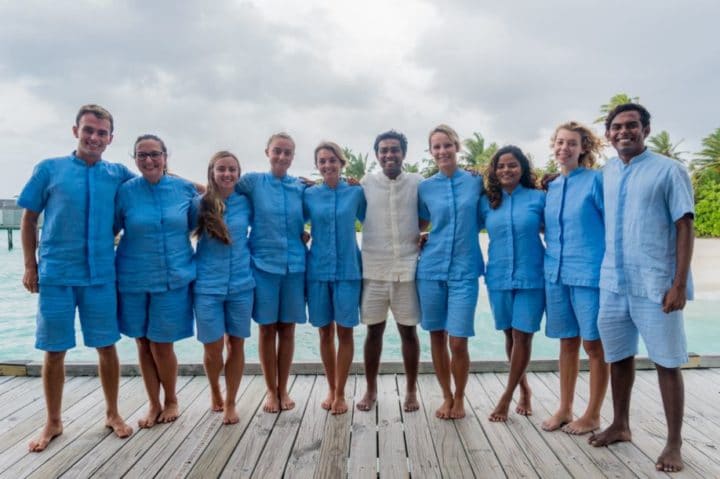
At Six Senses Laamu, its Maldives Underwater Initiative team (MUI) explores diverse fields of marine biology while introducing a new Junior Marine Program designed for children 6-16 years old. Here younger guests partake in up to seven program specialties from learning about marine ecology and its preservation of the habitats and coral reefs of Laamu and can graduation with a personal project to levels such as Eco-Warrior, Conservation Champion, and Junior Marine Biologist.

Six Senses Fiji, one of the newer resorts to open its door, has been reimagined for the future for its energy-efficiency by being 100% powered by solar electricity from Tesla batteries and sun to power its microgrid. Additional power is used for a desalination plant.
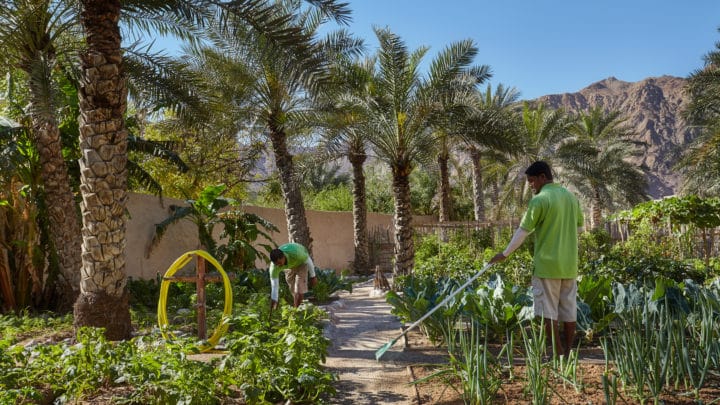
In Oman, Six Senses Zighy Bay is committed to supporting to the local Dibba Girl’s School, Sharjah Charity International and Sukarina bin Al Husain School. Since 2016, Six Senses Zighy Bay has been striving to involve hosts, villagers, local municipality and also guests in tree planting to make Zighy Bay as well as the near town Dibba a beautiful green landscape.
Six Senses Zil Pasyon created the Grow with Six Senses program designed book bags used from recycled materials by a company based in South Africa. Young guests can take back memories found on the Seychelles’ island of Félicité and encouraged to explore the island. Each book bag includes an aluminum water bottle and new plantable colored pencils which will sprout plants like basil, chia, coriander, daisies, forget-me-not and carnation seeds. Junior guests can also learn about the land and sustainability projects on the island through its curated storybook about the islands’ mascots, Anna the turtle and Steve the tortoise. Félicité Island just won 2nd place in the Africa category for Sustainable Top 100 Destinations at the 2019 IT Berlin Awards.
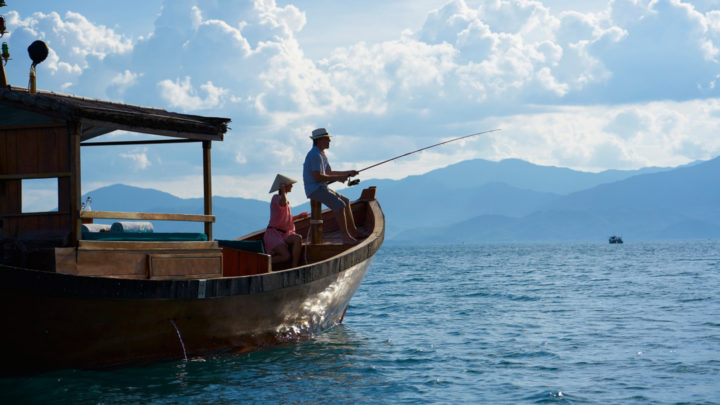
In 2018, Six Senses as a brand has achieved the following sustainability goals at their properties across the globe:
- 1,690,376 glass water bottles replaced disposable plastic bottles
- 539,677 pounds (244,793 Kg) of compost and natural fertilizer given back to Earth
- 158,759 pounds (72,012 Kg) of organic fruits and vegetables were grown for guests and communities nearly doubling our production of 31,512 Kg from 2017
- 32% of solid waste was diverted from landfill going toward recycling, reusing, etc.
- 3,549 meaningful local jobs were created
- 73,000 free-range organic eggs laid from Six Senses hens
- 16 kWh of energy on average was saved per one-night stay. This is enough to cook 331 bags of buttery microwave popcorn per night.
- 45 gallons (0.17 cubic meters) of water was saved on average per one-night stay
- US$ 635,422.39 Sustainability Funds were spent on Local Community & Environmental Projects (which equates to an additional US $90,500 than projects in 2017)
- 1,927,207 Non-plastic items introduced and implemented throughout the properties.
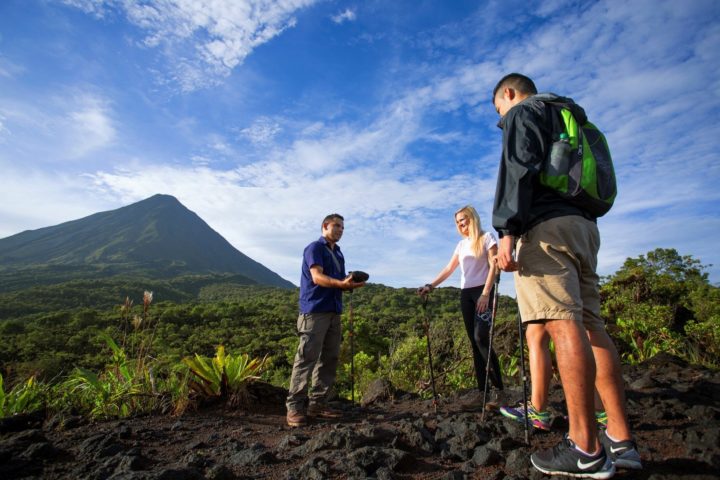
As travelers, each journey we embark on has purpose. Together we have the ability to make a positive impact on our planet by supporting properties and travel companies that are committed to sustainability and preserving the ecosystem of their surroundings while supporting local communities and enhancing opportunity for the future.
Happy Earth Day from the Hidden Doorways Team!
